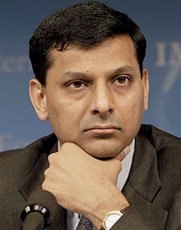World economy too reliant on a 'make-believe’ market: Raghuram Rajan
21 Jan 2016
The world economy is relying too much on the mirage called market, which seldom reflects the economic fundamentals, Reserve Bank governor Raghuram Rajan told the annual meeting of the World Economic Forum in Davos, Switzerland on Wednesday.
 The economic fundamentals do not justify the selloff in emerging markets, Rajan said, adding, "we are in a world of make believe," and wondered "what exactly are the fundamentals?"
The economic fundamentals do not justify the selloff in emerging markets, Rajan said, adding, "we are in a world of make believe," and wondered "what exactly are the fundamentals?"
But, he said, there is a deeper economic malice arising from the massive monetary stimulus of past years. "With many central banks with their feet firmly pressed on the accelerator, the variety of new aggressive monetary policies, it's not clear that we've really benefited tremendously," the RBI governor said.
"To some extent we may have reduced the room for other policies or reduced the incentives for other policies. We're not quite sure what the fundamental value of any asset is."
"And I would suspect that this is probably what is going on today, that as there is some anticipation that central banks will start reducing the accommodation, asset prices are trying to find the appropriate level."
His comments coincided the stock market rout in India, which saw the BSE Sensex crash below 24,000 points on Wednesday, hitting a 20-month low - and the Indian rupee slip past 68 a dollar for the first time since September 2013, when Rajan took charge of the RBI.
Rajan also rejected the idea that the emerging economies, especially India, is too cool to capital and there is a fall in aggregate demand. "I think it is markets' problem and the market problem can hit the real economy too," Rajan said.
There isn't anything in the world economy to support markets tantrums either, he said.
''One of the problems with capital flows is the volatility and there is a problem with many emerging markets that they cannot handle the volatility. You need to improve the processes for that,'' he said.
"Of course, it's hard to tell what the right levels for asset prices are, but is there something that changed dramatically over the last few weeks that would say the world economy is heading downwards? I don't think so. In fact, there is a fair amount of sense that, yes, we're trudging along more slowly than we should, but it's not the abyss that we're looking at," he said.
Rajan emphsised that lots of things are happening on the ground in India, "Things are moving, actions are being taken," but market is a negation of all these, he pointed out.
"I think if we persist in this, and I have no doubt that we will, this will amount to something much bigger. My sense is we are something like we were in 2001-02, when we did a lot of work but didn't show up in the growth numbers."
"We were laying the stage, and after that we had ten years of very strong growth. So my hope and my expectation is that, (and) that is what we are doing now. A lot of little, little reforms that combine together to make a big reform," he said.
Perhaps it takes time for efforts to show up in terms of asset prices, productivity etc and then times have changed. Earlier we used to see movies in theatres but now we see them on handheld devices, Rajan added.




















